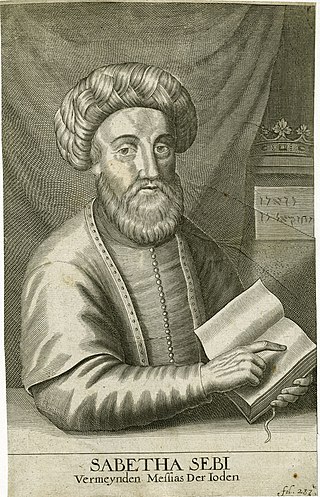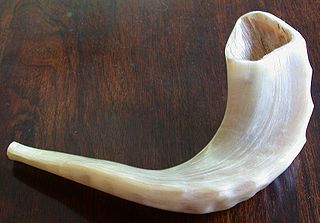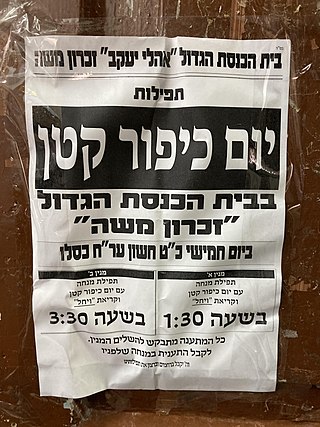This article contains too many or overly lengthy quotations .(February 2012) |
Christian observances of Yom Kippur occur when a Christian-style Day of Atonement models itself on the Jewish holiday of Yom Kippur.
This article contains too many or overly lengthy quotations .(February 2012) |
Christian observances of Yom Kippur occur when a Christian-style Day of Atonement models itself on the Jewish holiday of Yom Kippur.
In the Roman calendar still observed by Traditionalist Catholics, the Michaelmas Ember days (the Wednesday, Friday and Saturday of the first full week after 14 September (the Feast of the Exaltation of the Holy Cross, or "Roodmas") are penitential days inspired by the Jewish solemnities of the “seventh month,” Tishrei (תִּשְׁרֵי), especially Yom Kippur. Those days' first Lesson (liturgical reading) focuses on the Old Covenant’s Day of Atonement and the fast of the seventh month (Lev. 23, 26-32). [1]
As observed by the Living Church of God and United Church of God:
The Christian Day of Atonement is based on the English translation of the Jewish Holy day Yom Kippur. The day is commemorated with a 25-hour fast by Jews, but normally a 24-hour fast by Christians who observe it. While not observed by the mainstream of professing Christianity, the Christian groups (mostly those with origins in the old Worldwide Church of God) that do observe it usually refer to it as the Day of Atonement...[ citation needed ]
Generally, the Sacred Name Movement and groups reject Easter and Christmas as pagan in origin and observe the holy days of Leviticus 23 such as Yom Kippur, as well as Passover and the Feast of Weeks. [2] [ circular reference ]
Messianic Jewish congregations devote serious effort at presenting a rationale for taking Yom Kippur. Such as by the Emmanuel Messianic Jewish Congregation (Clarksville, Maryland, USA):
For believers in Yeshua, both Jewish and non-Jewish, the observance of Yom Kippur can hold special significance. The repentance started at Rosh HaShanah comes to a culmination with atonement ten days later. As with the traditional Jewish community, those ten days (Yomim Nora'im) can take on spiritual meaning as we meditate on the meaning of the high holy days. Although there are not many customs directly relating to the ten days, the message could be applied to a believer's daily meditation at that time. Traditional readings from the book of Jonah, Hosea 14 and other pertinent passages can enhance one's appreciation of the season...Blessed be the Lord God, who has secured our salvation in Yeshua the Messiah! That is what Yom Kippur is all about for those who call on his name... [3]
Jews for Jesus describes its observances of this day as follows:
...Yom Kippur can be somewhat of a conundrum to Jewish believers in Y'shua. Do we fast and confess our sins like the rest of the Jewish community or do we rejoice in the knowledge that we're forgiven in Messiah? Many Jewish believers view Yom Kippur as a time for identification with our Jewish people, introspection for ourselves and intercession for loved ones, knowing all the while that Jesus is the One that makes us at one with God... [4]
| | This section needs expansion. You can help by adding to it. (April 2022) |
Some argue that celebrating this holiday in the Christian faith is redundant in that Christians no longer observe the Day of Atonement since Christ has atoned for all sins once and for all.
Christianity began as a movement within Second Temple Judaism, but the two religions gradually diverged over the first few centuries of the Christian era. Today, differences of opinion vary between denominations in both religions, but the most important distinction is Christian acceptance and Jewish non-acceptance of Jesus as the Messiah prophesied in the Hebrew Bible and Jewish tradition. Early Christianity distinguished itself by determining that observance of halakha was not necessary for non-Jewish converts to Christianity. Another major difference is the two religions' conceptions of God. Depending on the denomination followed, the Christian God is either believed to consist of three persons of one essence, with the doctrine of the incarnation of the Son in Jesus being of special importance, or like Judaism, believes in and emphasizes the Oneness of God. Judaism, however, rejects the Christian concept of God in human form. While Christianity recognizes the Hebrew Bible as part of its scriptural canon, Judaism does not recognize the Christian New Testament.

Judaism is an Abrahamic monotheistic ethnic religion that comprises the collective spiritual, cultural, and legal traditions of the Jewish people. Judaism evolved from Yahwism, an ancient Semitic religion of the late Bronze Age to early Iron Age, likely around the 6th/5th century BCE. Along with Samaritanism, to which it is closely related, Judaism is one of the two oldest Abrahamic religions.

Jewish holidays, also known as Jewish festivals or Yamim Tovim, are holidays observed by Jews throughout the Hebrew calendar. They include religious, cultural and national elements, derived from three sources: mitzvot, rabbinic mandates, the history of Judaism, and the State of Israel.

Yom Kippur is the holiest day of the year in Judaism. It occurs annually on the 10th of Tishrei, corresponding to a date in late September or early October.
Shemini Atzeret is a Jewish holiday. It is celebrated on the 22nd day of the Hebrew month of Tishrei in the Land of Israel, and on the 22nd and 23rd outside the Land, usually coinciding with late September or early October. It directly follows the Jewish festival of Sukkot which is celebrated for seven days, and thus Shemini Atzeret is literally the eighth day. It is a separate—yet connected—holy day devoted to the spiritual aspects of the festival of Sukkot. Part of its duality as a holy day is that it is simultaneously considered to be both connected to Sukkot and also a separate festival in its own right.

Messianic Judaism is a syncretic Abrahamic new religious movement that combines various Jewish traditions with belief in Jesus of Nazareth as the Messiah. It is widely considered to be a sect of Evangelical Christianity, including by all major groups within mainstream Judaism, but the movement considers itself Jewish. Belief in Jesus as a messianic figure and as divine is considered by Jews to be one of the most defining distinctions between Judaism and Christianity.

Sabbatai Zevi was an Ottoman Jewish mystic, and ordained rabbi from Smyrna. His family origins may have been Ashkenazi or Spanish. Active throughout the Ottoman Empire, Zevi claimed to be the long-awaited Jewish Messiah and founded the Sabbatean movement.
Adherents of Judaism do not believe that Jesus of Nazareth was the Messiah nor do they believe he was the Son of God. In the Jewish perspective, it is believed that the way Christians see Jesus goes against monotheism, a belief in the absolute unity and singularity of God, which is central to Judaism; Judaism sees the worship of a person as a form of idolatry, which is forbidden. Therefore, considering Jesus divine, as “God the Son”, is forbidden. Judaism's rejection of Jesus as the Messiah is based on Jewish eschatology, which holds that the coming of the true Messiah will be associated with events that have not yet occurred, such as building the Third Temple, a Messianic Age of peace, and the ingathering of Jews to their homeland.

In Judaism, the High Holy Days, also known as High Holidays or Days of Awe consist of:

A ta'anit or taynis is a fast in Judaism in which one abstains from all food and drink, including water.
Christian observance of Passover is in modern times referred to as Holy Thursday or Maundy Thursday and is held the day before Good Friday. Sometimes a shortened Sedar meal is practiced. Many churches do a washing of the feet of the congregation on this day in recognition of Jesus washing the apostles feet at the last supper. [oremus Bible Browser : John 13:5–14] It marks the end of the Lenten season.
High Sabbaths, in most Christian and Messianic Jewish usage, are seven annual biblical festivals and rest days, recorded in the books of Leviticus and Deuteronomy. This is an extension of the term "high day" found in the King James Version at John 19:31.

The Hebrew Roots Movement (HRM) is a religious movement that advocates adherence to the Torah and believe that Y'shua or Jesus, is the Messiah. The movement stipulates that the Law of Moses was not abolished by Y'shua or Jesus and is, therefore, still in effect for his followers. Because HRM believes the Mosaic law is still active, it advocates the keeping of the seventh-day Sabbath; biblical feasts; laws of cleanlines; and circumcision. Some HRM followers also choose to wear tzitzit and other Hebrew religious items. However, HRM followers do not generally follow Judaism or embrace the Talmud. Unlike other Christians, most HRM followers reject the traditional holidays of Christmas and Easter, insisting that they are pagan traditions.
Messianic Bible translations are translations, or editions of translations, in English of the Christian Bible, some of which are widely used in the Messianic Judaism and Hebrew Roots communities.
This is a glossary of terms used in Christianity.
Lists of holidays by various categorizations.

The Sabbath is a weekly day of rest or time of worship given in the Bible as the seventh day. It is observed differently in Judaism and Christianity and informs a similar occasion in several other faiths. Observation and remembrance of Sabbath is one of the Ten Commandments considered to be the fourth in Judaism, Eastern Orthodoxy, and most Protestant traditions, and the third in Roman Catholic and Lutheran traditions.

Yom Kippur Katan, is a practice observed by some Jews on the day preceding each Rosh Chodesh. The observance consists of fasting and supplication, but is much less rigorous than that of Yom Kippur proper.

Some Christian groups incorporate Jewish holidays into their religious practice, typically altering and reinterpreting their observation to suit a supersessionist theology.
Yom tov sheni shel galuyot, also called in short yom tov sheni, means "the second festival day in the Diaspora". This is a principle in halakha that mandates the observance of an additional day for Jewish holidays outside the Land of Israel.